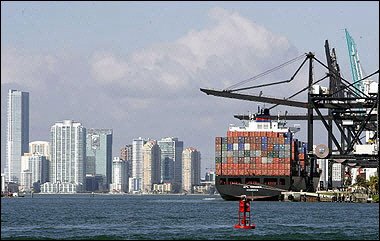 Members of the Teamsters Union take part in a rally across the street from the Seagirt Terminal in Baltimore, Maryland February 24, 2006. The rally was held to protest the sale of U.S. port operations to Dubai Ports World. REUTERS/Joe Giza
Members of the Teamsters Union take part in a rally across the street from the Seagirt Terminal in Baltimore, Maryland February 24, 2006. The rally was held to protest the sale of U.S. port operations to Dubai Ports World. REUTERS/Joe GizaSome more on Portgate here. This is from Yahoo News:
WASHINGTON - The Homeland Security Department objected at first to a United Arab Emirates company's taking over significant operations at six U.S. ports. It was the lone protest among members of the government committee that eventually approved the deal without dissent.
he department's early objections were settled later in the government's review of the $6.8 billion deal after Dubai-owned DP World agreed to a series of security restrictions.
The company indefinitely has postponed its takeover to give President Bush time to convince Congress that the deal does not pose any increased risks to the U.S. from terrorism.
Some lawmakers have pressed for a new and intensive review. Despite persistent criticism from Republicans and Democrats, the president has defended his administration's approval of the ports deal and threatened to veto any measures in Congress that would block it. Hearings are to continue this week.A cargo ship sits at the dock at the Port of Miami, in Miami, Florida. A United Arab Emirates company has agreed to postpone its plans to take over management of six US ports after the proposed deal ignited harsh criticism from both Democrats and Republicans on national security grounds.(AFP/File/Robert Sullivan)
So the Department of Homeland Security objected to this deal at first? Why? It was the lone protester among the committee, until a review was made on security? What was the deal that was made between Homeland Security and the rest of the Committee on Foreign Investment in the United States? Continuing on:
The administration approved the ports deal on Jan. 17 after DP World agreed during secret negotiations to cooperate with law enforcement investigations in the future and make other concessions.
Some lawmakers have challenged the adequacy of a classified intelligence assessment crucial to assuring the administration that the deal was proper. The report was assembled during four weeks in November by analysts working for the director of national intelligence.
The report concluded that U.S. spy agencies were "unable to locate any derogatory information on the company," according to a person familiar with the document. This person spoke only on condition of anonymity because the report was classified.
Sen. Carl Levin (news, bio, voting record), D-Mich., and others have complained that the intelligence report focused only on information the agencies collected about DP World and did not examine reported links between UAE government officials and al-Qaida leader Osama bin Laden before the Sept. 11 attacks.
Stewart Baker, a senior Homeland Security official, said he was the sole representative on the Committee on Foreign Investment in the United States who objected to the ports deal. Baker said he later changed his vote after DP World agreed to the security conditions. Other officials confirmed Baker's account.
"We were not prepared to sign off on the deal without the successful negotiation of the assurances," Baker told the AP.
So Homeland Security was concerned about the security aspects regarding the operation of the ports themselves. They were worried about terrorists infiltrating American ports to conduct attacks within the country. That is an acceptable concern for Homeland Security. But I do find it interesting that the intelligence community, or the Committee on Foreign Investment did not look into ties between al Qaida terrorists and the government of the United Arab Emirates? DP World is owned by the government of UAE. Why wasn't this taken into account? Is it not possible for lower level UAE government officials, who may be receptive to al Qaida views, to provide al Qaida terrorists with the means, through government channels, to gain access into DP World-controlled American ports? And it doesn't have to be for terrorist activities--how about smuggling activities, which can provide profits to fund al Qaida's bank accounts, and terror activities?
Why were these issues not taken into account for the sale?



No comments:
Post a Comment